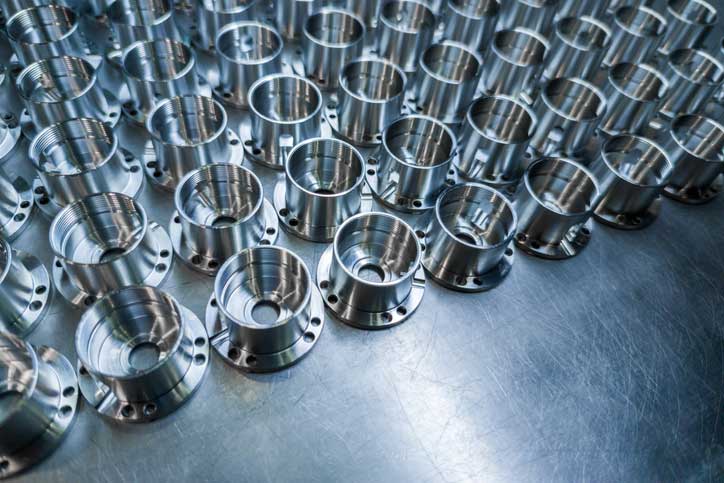
If you contract out metal fabrication, you may have wondered why it is necessary to work with a partner with a formal quality system. And if you have not given the quality system of your fabrication partner any thought, you may want to. Welding and fabrication shops with a robust and effective quality management system are required to document and implement quality practices. These result in a consistently high-quality product being delivered to you.
What is Quality?
ISO 9000:2015 defines quality as the “degree to which a set of inherent characteristics of an object fulfills requirements.” The requirements can come from the customer, a regulation, or an industry standard. If a fabricator tells you they make quality products, they really aren’t telling you much. Adjectives such as poor, good, or excellent must be assigned to clarify the degree of compliance.
To measure this, a fabricator needs a quality management system is needed. A quality management system is made up of several components, two of which are quality assurance and quality control. Quality assurance focuses on providing confidence that quality requirements will be fulfilled. This component works to prevent errors through quality policies and processes. However, having confidence isn’t always enough, as no system is foolproof. They need to make sure that the requirements are actually being fulfilled. That is where quality control or QC comes in. It focuses on finding and correcting errors before the parts get to the customer.
Beyond receiving a product that meets your requirements and expectations, a formal quality management system provides additional value that provides a positive return on your metal fabrication investment.
Maintain Consistency
Consistency is a cornerstone of a solid quality management system. If you get products that are within spec sometimes and other batches are out of spec, your fabricator does not have a strong quality system in place. A quality management system is designed for manufacturing process improvements, ensuring increased efficiency and operational excellence. Fabrication methods are standardized to improve repeatability for even the most challenging projects. QC checks ensure quality remains consistent from batch to batch.
In addition to processes and policies that prevent errors or find and correct them, communication is critical. Your fabrication partner should communicate with you every step of the way. The expectation and requirements for the fabricated part should be clear to both parties.
Improve Cost Effectiveness
A successful quality management system innately controls costs. Defective parts can result in scrap and rework, adding unexpected costs to solve. This can also add time to your schedule, creating delays in your processes or getting your product to market, resulting in lost revenue.
If defective parts make it to your customers, you can face exorbitant costs associated with lost customers, legal fees if someone is hurt, and recalled products.
Ensure Compliance
Many fabricated products must meet safety, performance, and/or regulatory standards. For example, products used in the food and beverage industry must meet the requirements of the USDA or FDA for food contact. Many customers may require 3A sanitary standards to be met as well. Other industries, such as Aerospace and defense, have tight tolerances for parts and may require a manufacturer to be International Traffic In Arms Regulations (ITAR) compliant.
A well-designed and implemented quality management system assures that your product will meet all requirements – regulatory, industry standards, or yours.
Lessen Risks and Hazards
Defective products can be a safety hazard. An effective quality system has checks in place to allow manufacturers to see a potential problem before it becomes a hazard. If your product carries an inherent risk where failure could result in catastrophic results, ensuring your fabricator has a string quality system is no longer a nice to have; it is critical.
If your product is used in the workplace and is found to be defective and someone gets hurt, you could be facing OSHA fines or worse. If your product is part of a critical operation and fails, this could result in your customer seeking compensation for damages or more if someone is hurt.
Enhances Your Customer Relationships
Excellent quality has a trickle-down effect. When your parts are coming from a metal fabricator that values producing high-quality parts consistently, your customers will know they can count on you to meet their needs.
Conversely, poor-quality parts will reflect badly on you and tarnish your reputation. That isn’t a risk worth taking. A partner that values quality will consider themselves an extension of your company. They will ensure parts are in spec, properly shipped to prevent damage, and delivered to your satisfaction.
Sourcing a Metal Fabrication Partner with a Formal Quality System
When quality, cost, service, and delivery matter, Cameron Manufacturing and Design is your one-stop metal fabrication, engineering, and Installation partner. We never compromise on quality. We are ISO 9001:2015 certified, which provides the foundation for our quality system.
To ensure every product fabrication meets your specifications, we have QC inspections through all production phases: first article, in-process inspection, and final inspection. We strive to promptly meet the needs of our customers by providing high-quality products that we can both be proud of.
Contact us for a competitive bid or to learn more about our services.
Recent Posts
- Crafting Excellence Bridging Heavy Fabrication and Light Manufacturing
- What is Precision Sheet Metal Fabrication
- Unveiling the Power of Custom Manufacturing Equipment in NY
- Cameron Manufacturing & Design: Your Top Choice for CNC Laser Projects
- The Power of Precision Machining in Custom Metal Fabrication
Trust the CMD Team With Your Next Project
Our highly-skilled team across multiple areas of expertise will deliver a finished product that meets or exceeds your expectations.
